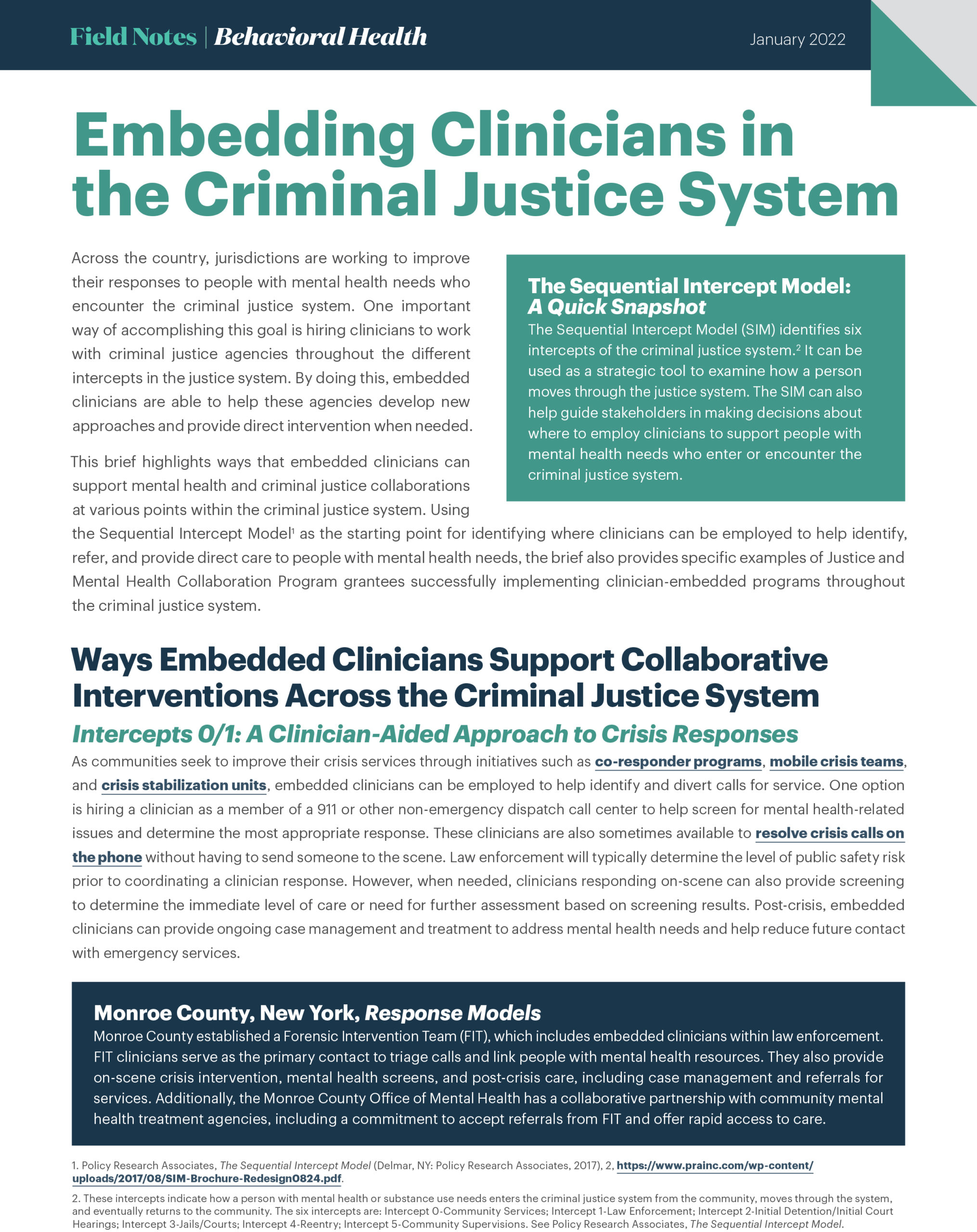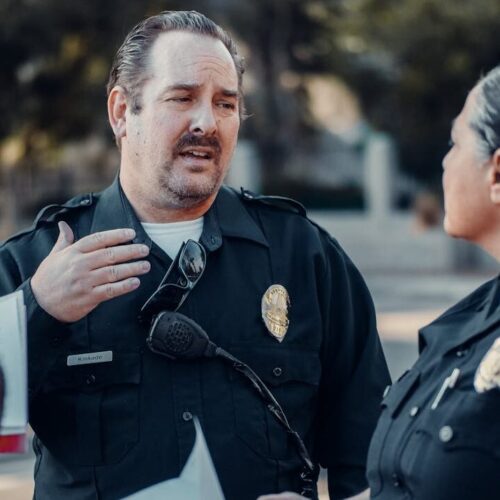Embedding Clinicians in the Criminal Justice System
Hiring clinicians to work with criminal justice agencies throughout the different intercepts in the justice system is one way that jurisdictions are working to improve their responses to people with mental health needs. Using the Sequential Intercept Model as the starting point for identifying where clinicians can be employed, this brief highlights ways that embedded clinicians can support mental health and criminal justice collaborations. It also provides specific examples of Justice and Mental Health Collaboration Program grantees successfully implementing clinician-embedded programs throughout the criminal justice system. Photo credit: cottonbro from Pexels
Embedding Clinicians in the Criminal Justice System
Across the country, jurisdictions are working to improve their responses to people with mental health needs who encounter the criminal justice system. One important way of accomplishing this goal is hiring clinicians to work with criminal justice agencies throughout the different intercepts in the justice system. By doing this, embedded clinicians are able to help these agencies develop new approaches and provide direct intervention when needed.
This brief highlights ways that embedded clinicians can support mental health and criminal justice collaborations at various points within the criminal justice system. Using the Sequential Intercept Model1 as the starting point for identifying where clinicians can be employed to help identify, refer, and provide direct care to people with mental health needs, the brief also provides specific examples of Justice and Mental Health Collaboration Program grantees successfully implementing clinician-embedded programs throughout the criminal justice system.
The Sequential Intercept Model: A Quick Snapshot
The Sequential Intercept Model (SIM) identifies six intercepts of the criminal justice system.2 It can be used as a strategic tool to examine how a person moves through the justice system. The SIM can also help guide stakeholders in making decisions about where to employ clinicians to support people with mental health needs who enter or encounter the criminal justice system.
Ways Embedded Clinicians Support Collaborative Interventions Across the Criminal Justice System
Intercepts 0/1: A Clinician-Aided Approach to Crisis Responses
As communities seek to improve their crisis services through initiatives such as co-responder programs, mobile crisis teams, and crisis stabilization units, embedded clinicians can be employed to help identify and divert calls for service. One option is hiring a clinician as a member of a 911 or other non-emergency dispatch call center to help screen for mental health-related issues and determine the most appropriate response. These clinicians are also sometimes available to resolve crisis calls on the phone without having to send someone to the scene. Law enforcement will typically determine the level of public safety risk prior to coordinating a clinician response. However, when needed, clinicians responding on-scene can also provide screening to determine the immediate level of care or need for further assessment based on screening results. Post-crisis, embedded clinicians can provide ongoing case management and treatment to address mental health needs and help reduce future contact with emergency services.
Monroe County, New York, Response Models
Monroe County established a Forensic Intervention Team (FIT), which includes embedded clinicians within law enforcement. FIT clinicians serve as the primary contact to triage calls and link people with mental health resources. They also provide on-scene crisis intervention, mental health screens, and post-crisis care, including case management and referrals for services. Additionally, the Monroe County Office of Mental Health has a collaborative partnership with community mental health treatment agencies, including a commitment to accept referrals from FIT and offer rapid access to care.
Intercepts 2/3: A Clinician’s Role in Making Connections between Jail and Court-Based Diversion Programs
Clinicians embedded in county jails play a key role during initial bookings by screening and assessing people to help determine if they have any mental health needs. This early identification can help better connect people to care while they are in the jail and/or determine potential options for jail diversion. For example, clinicians can provide important behavioral health information to the court to help inform legal and treatment decisions. They can also provide evidenced-based interventions through individual or group treatment while the person is in the facility to help them prepare for reentry.
When embedded in the court system, clinicians can be employed to provide the court with updates on a person’s progress and challenges; they can also assist the court in developing a plan to help the individual meet legal and treatment requirements to resolve their case. In treatment courts, clinicians serve as liaisons between the court and the treatment team, as well as advocates for people under court supervision.
Colorado, Court Liaisons
In Colorado, the state-based Bridges Program places behavioral health professionals in each state judicial district to act as court liaisons and facilitate assessments and connections to needed care. The court liaisons also work to ensure that judges, prosecutors, and defense attorneys are informed about mental health services available in their communities. These services can include resources and supports for defendants who have been ordered to undergo an evaluation to determine their competency and people who require services to restore competency.
Intercepts 4/5: Clinician-Facilitated Reentry Planning
Throughout reentry planning, embedded clinicians can serve in different capacities including as discharge planner, lead case manager, or direct care provider. In any of these roles, clinicians help connect people to community-based treatment opportunities, family, religious, and community supports, as well as other resources that can aid their transition into the community. During pre-release planning, clinicians often have an opportunity to help develop a collaborative comprehensive case plan to identify the types of support the person will need upon reentering the community. In addition, most jurisdictions have the capacity for clinicians to identify and link the person to the appropriate community support while still in custody.
Franklin County, Massachusetts, Reentry Services
In Franklin County, the sheriff’s office has embedded clinicians who provide reentry services to all individuals leaving the jail. Reentry case workers (RCWs) engage with people upon and after release to help in navigating reentry and addressing barriers such as transportation and housing. RCWs connect people to wrap-around services in partnership with treatment providers.
Dig Deeper
The Council of State Governments Justice Center offers free in-depth subject matter expertise and can answer questions about embedding clinicians into mental health-criminal justice programs. Visit the Center for Justice and Mental Health Partnerships to learn more.
Additional Resources
The Strategy Lab features more than a hundred examples of jurisdictions working to reduce the number of people with serious mental illnesses in their jails.
The Taking the Call website offers video recordings from the national conference on community responder models held in October 2021, as well as additional resources intended to help communities build effective and comprehensive crisis systems.
The Expanding First Response toolkit serves as a central hub for local communities and states looking to establish or strengthen community responder programs.
Footnotes
1 Policy Research Associates, The Sequential Intercept Model (Delmar, NY: Policy Research Associates, 2017), 2, https://www.prainc.com/wp-content/uploads/2017/08/SIM-Brochure-Redesign0824.pdf.
2 These intercepts indicate how a person with mental health or substance use needs enters the criminal justice system from the community, moves through the system, and eventually returns to the community. The six intercepts are: Intercept 0-Community Services; Intercept 1-Law Enforcement; Intercept 2-Initial Detention/Initial Court Hearings; Intercept 3-Jails/Courts; Intercept 4-Reentry; Intercept 5-Community Supervisions. See Policy Research Associates, The Sequential Intercept Model.
Project Credits
Writing: Ethan Kelly, CSG Justice Center and Andrea Chambers
Research: Ethan Kelly, CSG Justice Center
Advising: Mark Stovell and Demetrius Thomas, CSG Justice Center
Editing: Darby Baham, CSG Justice Center
Design: Michael Bierman
Public Affairs: Ruvi Lopez, CSG Justice Center
Web Development: eleventy marketing group
This project was supported by Grant No. 2019-MO-BX-K001 awarded by the Bureau of Justice Assistance. The Bureau of Justice Assistance is a component of the Department of Justice’s Office of Justice Programs, which also includes the Bureau of Justice Statistics, the National Institute of Justice, the Office of Juvenile Justice and Delinquency Prevention, the Office for Victims of Crime, and the SMART Office. Points of view or opinions in this document are those of the author and do not necessarily represent the official position or policies of the U.S. Department of Justice.
About the Author
The sharp rise in school shootings over the past 25 years has led school officials across the U.S.…
Read MoreA three-digit crisis line, 988, launched two years ago to supplement—not necessarily replace—911. Calling 988 simplifies access to…
Read More Taking the HEAT Out of Campus Crises: A Proactive Approach to College Safety
Taking the HEAT Out of Campus Crises: A Proactive Approach to College Safety
The sharp rise in school shootings over the past 25 years has…
Read More From 911 to 988: Salt Lake City’s Innovative Dispatch Diversion Program Gives More Crisis Options
From 911 to 988: Salt Lake City’s Innovative Dispatch Diversion Program Gives More Crisis Options
A three-digit crisis line, 988, launched two years ago to supplement—not necessarily…
Read More Matching Care to Need: 5 Facts on How to Improve Behavioral Health Crisis Response
Matching Care to Need: 5 Facts on How to Improve Behavioral Health Crisis Response
It would hardly be controversial to expect an ambulance to arrive if…
Read More














